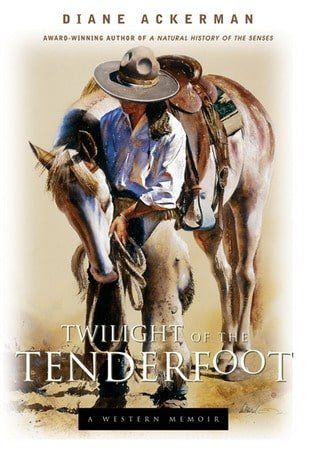TWILIGHT OF THE TENDERFOOT: A Western Memoir

BUY THIS BOOK
The landscape of one's heart's desire. For Diane Ackerman, it is the American West, the life and land of the cowboy, that excites her imagination and her naturalist's passion for the earth.
An adventurer determined to realize her dream, she sets out from the East and the relative security of academe to live on a New Mexico cattle ranch where cowboying goes on as it has for ages. As soon as she arrives at the Tequesquite ranch, she pulls on her boots and gets down to work: riding herd; wrestling, branding, and delivering calves; mixing easily with the cowboys. Even as time passes, she is continually amazed to find herself "out on the prairie where there are no walls... riding freely across the range in the same mythic West that salted my childhood with its six-shooting cowboys and burly desperadoes..."
As a tenderfoot — and a woman in a man's world — she undergoes an often hilarious initiation; but she is game and spirited and altogether up to the challenges of red-hot chiles, Red Man chewing tobacco, revved-up horses, snakes dangling from brooms, and backbreaking work well before sunrise.
Diane Ackerman captures the cowboy's swiftly vanishing way of life in vital, exuberant prose. Only a writer of her stature could render so vividly a wold as familiar as the Marlboro Man's and as exotic as Mars, a place where "Civilization doesn't exactly disappear; it just seems beside the point."
REVIEWS AND COMMENTS
"When Diane Ackerman wonders, her eyes go wide as chuckwagon chow plates; when she thinks, her brain flashes like a panhandle sky in storm. Because she knows the land of the heart, she's exquisitely rendred the heart of this land." — Albert Goldbarth
"She brings a proud, disciplined, lyrical intelligence to the western ranch experience which is unique for any American, especially an academic. Altogether an unexpected piece of high-bucking prose..." — Seymour Krim
Poet Ackerman (The Planets: A Cosmic Pastoral) spent a few weeks, on and off, on the Tesquesquite, a vast New Mexican cattle ranch, in search of the vanishing cowboy, and came up with this self-absorbed account. She times her seasonal visits to coincide with such chores as branding and calving, works alongside the men, and describes both the timeless procedures and the new technological aids--from tape decks to helicopters--of the cowboy's trade. But her observations are clouded by romance: all the cowboys are beautiful, rough, and tough, all their horses "tightly muscled and meticulously trained." Being a cowboy, it turns out, is very hard work--dirty, bone-shattering, and endless--but mundane questions of wages, benefits, and longevity (or why the cowboy vanishes) are not her concern. She confides some tricks of the cowboy's trade--such as how to use a horse for a sundial--and often waxes poetic about the "dramatic" landscape and the "thrill" of cowboy-watching. But mostly she is concerned with "why on earth should I come here" among strangers "who baffle easily when I speak in my normal way." The western terrain--especially the description of work--is engrossing, but the poet's little condescending sayings and doings are more tedious than any prairie. — Kirkus Review
"A good account of life on a ranch in the Land of Enchantment... certainly refreshing." — Bruce King, Governor of New Mexico
"One aspect of this book to admire, once you're through admiring the courage and zeal of its author, is the language. It is offered with a poet's touch, which means that words are not manipulated for the pleasure of fondling them, but for the sake of getting the experience right, then getting it across in a useful and memorable way. Ackerman is good at her job, and so we feel the life of the ranch. As charming as the prose is, so is Ackerman's gusto exemplary; she is in touch with the roots of American history, she knows it, and wants to take in as much as she can. What is stirring in Diane Ackerman's book is that she refuses to be persuaded by the West's self-generating myths about itself... What she offers is far from the cliché of Western Hombre and Western Gal, yet is delicately tinged with our own nostalgia for what we once believed. She recovers for us what most of us didn't know we were losing. And therefore she places us significantly in her debt — for her book's unpretentious fun, for her gently-offered insights, for the pleasure of her language and her company." — Frederick Busch